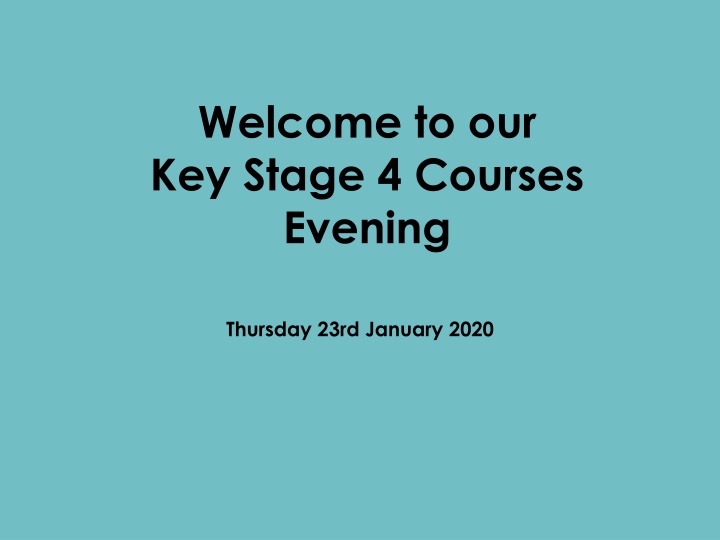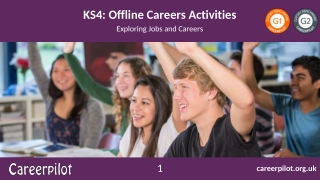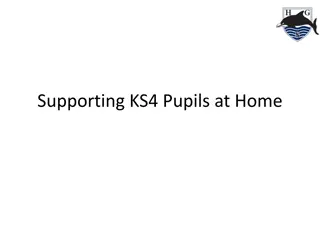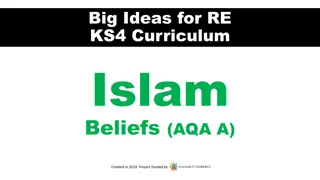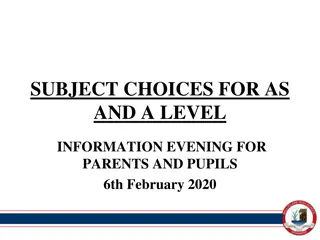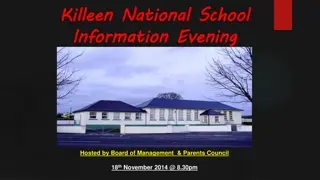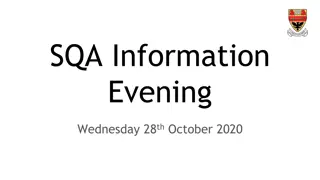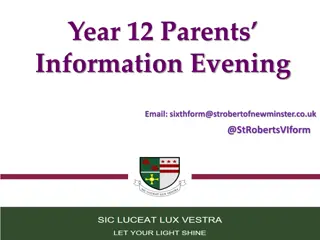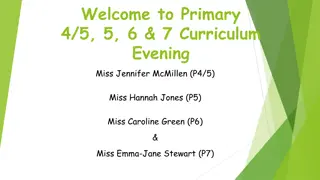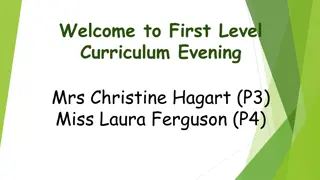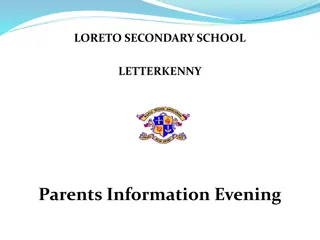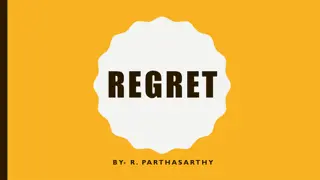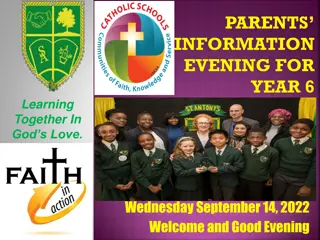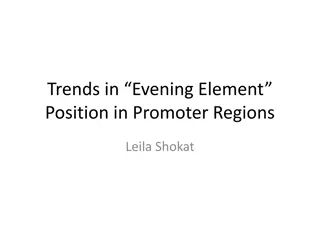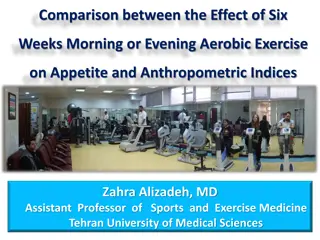Key Stage 4 Courses Overview: GCSEs, Qualifications, Curriculum, and Examinations
Explore the Key Stage 4 courses offered, including details on GCSE grading, J Scale for GCSE comments, qualification types, Year 9 curriculum, Year 10 and 11 curriculum, GCSE English examinations, and science options. Gain insights into English Language, English Literature, Maths, Science, Humanities, PE, PSHE, and more. Understand the grading system from GCSE grade 1 to 9 and learn about the various vocational qualifications available. Prepare for exams that cover reading, writing skills, as well as poetry, prose, and drama texts. Dive into this informative content to navigate through the Key Stage 4 educational journey effectively.
Download Presentation

Please find below an Image/Link to download the presentation.
The content on the website is provided AS IS for your information and personal use only. It may not be sold, licensed, or shared on other websites without obtaining consent from the author.If you encounter any issues during the download, it is possible that the publisher has removed the file from their server.
You are allowed to download the files provided on this website for personal or commercial use, subject to the condition that they are used lawfully. All files are the property of their respective owners.
The content on the website is provided AS IS for your information and personal use only. It may not be sold, licensed, or shared on other websites without obtaining consent from the author.
E N D
Presentation Transcript
Welcome to our Key Stage 4 Courses Evening Thursday 23rd January 2020
New GCSEs- graded 1 to 9 1 = GCSE grade F/G 2 = GCSE grade E 3 = GCSE grade D 4 = GCSE grade C 5= GCSE grade C+ or B- 6= GCSE grade B 7= GCSE grade A 8= GCSE grade A* 9= Exceptional standard above GCSE A*
J Scale GCSE Comment Grade 1 3-5 The lowest grade- F/G 6-8 2 9-11 3 12-14 4 Equivalent to a low C grade 15-17 5 New national expectation, just over 50 % nationally will achieve this grade across England 18-20 6 21-23 7 Equivalent to an A grade 24-26 8 27-29 9 Above an A* , about 2% nationally will achieve this grade across England Beyond GCSE, at A-Level standard 30+
Qualification types A mixture of traditional and vocational qualifications GCSE 9-1 Grades BTEC Certificate Distinction*-Pass (9-4) Cambridge National Award Distinction*-Pass (9-4)
The Year 9 Curriculum Hours Qualification Subject English 4 English and English Literature GCSE Maths 4 Maths GCSE Science 4 All students study Combined Science in Year 9 Either French, German Either Geography or History Language Humanity PE PSHE RE/Citizenship 1 Chosen subjects 3/2 3/2 2 1 Taught in two tutor times 2 x 2 GCSEs, BTECs, Cambridge National
Year 10 and 11 Curriculum Subject Hours Qualification English 4 English and English Literature GCSE Maths 4 Maths GCSE Science 5 or 6 Either GCSE combined science Or Biology, Chemistry and Physics PE PSHE Language 2/3 Humanity Chosen subjects 2 1 Taught in two tutor times 2/3 2 x 3 GCSEs or BTECs
GCSE English Examinations in English Language which will test reading and writing skills Students take a GCSE in English Language and a GCSE in English Literature. There will be separate speaking and listening assessments Examinations in English Literature will test understanding of poetry, prose and drama texts
Science Options Combined Science: (two GCSEs) Studied over 5 lessons per week in years 10/11 Gives two (9-1) grades at the end of year 11 6 x 1hr 10 min exams in year 11 OR Separate Sciences: (three GCSEs) Each subject has 2 lessons per week 3 GCSEs studied over years 10 and 11 giving 3 (9-1) grades Biology, Chemistry and Physics 6 x 1hr 45 min exams in year 11 Both routes offer entry onto A-level science subjects. Entry onto A Level subjects depend upon both grades and student effort/commitment.
Separate Sciences option Commit to attending an after school lesson every Tuesday in Years 10 and 11 and extra homework each week. Exams: 6 x 1 hour 45 minute exams (2 Biology, 2 Chemistry and 2 Physics) at the end of Year 11. This may make it more difficult for those who find writing for an extended time challenging. All students are welcome to apply for the Separate Sciences however: As this course is generally oversubscribed not all students will be offered a place. Places are decided by a combination of: Effort in lessons and homework Care and concentration shown in lessons Attitude and commitment to extra study Performance in extended exams in year 9
Any questions? Your science teacher will be able to discuss with you the most suitable route to choose. In addition the following staff can also help: Mr Jennings, Faculty Leader Miss Clayton, Assistant Faculty Leader
GCSE Maths Examinations in Maths will test Number, Algebra, Data Handling, Shape Space and Measures The exam is undertaken at the end of Year 11 Three papers of equal weighting, one of which is non-calculator Two tiers of papers (entry confirmed in March Year 11) Foundation 5-1 Higher 9-4
Pathways There will be two pathways, A and B Pathway A Students will follow the EBACC and be expected to aim for a minimum of grade 5 (equivalent to a C+/B-) in these subjects Pathway B Students will be offered the chance to do the EBACC but may find it more difficult to achieve a grade 5. There will be alternative choices if they wish not to study a language
The KS4 Courses form 2020 2023 (Pages 29/30 of the options booklet) Part A Compulsory Subjects Allstudents will study the following courses: English Language and English Literature Mathematics Science Combined (or separate sciences; Biology, Chemistry, Physics) French, German (or an alternative) Geography or History and non-examination courses in RE/Citizenship (Year 9), PSHE and PE.
Part B Chosen Subjects Pathway A In Box A you will choose French or German. If you wish to do two languages please choose French here, indicating the priority order. In Box B you will choose Geography or History. If you wish to do two Humanities then choose History here, indicating the priority order. Pathway B In Box A you may choose French or German or indicate that you do not wish to study a language. In Box B you will choose Geography or History
In Box C you make 3 choices in priority order (one is a reserve choice) GCSE Art and design GCSE Food Preparation and Nutrition* Cambridge National Enterprise and Marketing GCSE German (as a second language) GCSE Computing GCSE History (as a second Humanity) GCSE Music BTEC Health and Social Care GCSE Dance GCSE 3D Design* GCSE Drama GCSE PE BTEC Travel and Tourism Your order of preference is very important. * Students can only study one technology option.
Box D Students wishing to be considered for Separate Sciences must tick the box to confirm this.
Subject Allocation All student choices are considered at the same time. Subjects are placed into timetabled blocks to maximise student Choices based on the combinations chosen Pathway A block A will be at the same time as Pathway B block B and vice versa
Subject Blocks There will be four Subject choice blocks The subjects in one block are all taught at the same time on the timetable Example Block 3 and 4 are just an example of what could happen
Timetable A Year 9 timetable may look like this Monday English Maths Tuesday English Maths Wednesday Maths Block 1 Break Thursday Block 4 Block 4 Friday Science Maths 1 2 3 4 Block 1 Science PE Block 3 Block 3 Lunch Science English English Block 1 Block 2 5 Block 2 Science Block 2 PE RE/Citizenship
Calendar of events KS4 Course choice interviews will commence on Monday 27th January. KS4 Course choice interview period Y8 Parents Evening Deadline for submitting Course forms February 7th Y8 Progress Check Initial Allocations sent home Y8 Exam weeks Y8 Report January 27th February 7th February 6th March 2nd Easter April 30th June 22nd
Choosing the right Courses Where are you at right now?
Next steps Information Gathering sources of information: Faculty Leaders Teachers Prefects Other students Parents BUT remember all sources of information are biased. Information and experience serve as guidelines.
KS4 Course Choice Interviews Interviews can be booked in the dining room following this presentation. Beacon Mr Evans Holywell Mr Collard Jubilee Mr Williams Midsummer Mr Wyatt (a)/Mr Hammond (b) Selected Students Mrs Barker, Miss Newnes Following this evening appointments can be booked over the phone.
Dispelling the Myths 1. Courses are first come first served. 2. No reserve choices = I get what I want. 3. I can change without my parents knowing. 4. If I don t take now, I won t beable to study . Later. 5. Taking means I do less work. 6. If I do I am guaranteed to do really well. 7. If I take I am bound to get that teacher. 8. If my friends and I choose we will all be together.
Why might I not get my course choices? There is a change in the staffing structure of the school There are insufficient numbers to run a course There are too many students choosing one particular course There is strong evidence to suggest this is not an appropriate choice
In Summary Seek Opinions. Listen to advice. Ask the right questions. Read the course booklet. Select the courses that work for you. Be ready to justify your choices at the interview!
